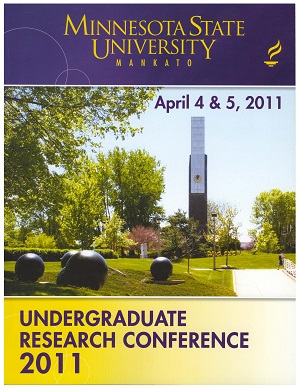Construction Of Autonomous Vehicle for the SparkFun Competition
Location
CSU 253/4/5
Start Date
4-4-2011 1:30 PM
End Date
4-4-2011 3:00 PM
Student's Major
Electrical and Computer Engineering and Technology
Student's College
Science, Engineering and Technology
Mentor's Name
Vincent Winstead
Mentor's Department
Electrical and Computer Engineering and Technology
Mentor's College
Science, Engineering and Technology
Description
In order to construct a completely autonomous robot vehicle, a combination of C programming, GPS orientation data measurement and hardware-software coordination is applied to construct an experimental robot. The robot is intended to be used as an entrant in SparkFun's autonomous vehicle navigation competition. C-programming software will be developed to direct the on-board mini-computer (SheevaPlug) to record the GPS and navigation sensors data and to communicate with the acceleration and steering components of the robot through the Arduino board to control the movement of the robot. The robot‘s performance will be repeatedly tested before its presentation at the SparkFun Autonomous Vehicle Competition in 2011. This robot‘s abilities will be optimized to move fast enough and avoid obstacles in its path. A major emphasis will be put on ensuring that the robot robustly completes the course at the SparkFun Autonomous Vehicle Competition. It is expected that the holistic approach followed in the construction of this robot, i.e. combining GPS with hardware-software synchronization and C programming, will result in a winning competition vehicle.
Construction Of Autonomous Vehicle for the SparkFun Competition
CSU 253/4/5
In order to construct a completely autonomous robot vehicle, a combination of C programming, GPS orientation data measurement and hardware-software coordination is applied to construct an experimental robot. The robot is intended to be used as an entrant in SparkFun's autonomous vehicle navigation competition. C-programming software will be developed to direct the on-board mini-computer (SheevaPlug) to record the GPS and navigation sensors data and to communicate with the acceleration and steering components of the robot through the Arduino board to control the movement of the robot. The robot‘s performance will be repeatedly tested before its presentation at the SparkFun Autonomous Vehicle Competition in 2011. This robot‘s abilities will be optimized to move fast enough and avoid obstacles in its path. A major emphasis will be put on ensuring that the robot robustly completes the course at the SparkFun Autonomous Vehicle Competition. It is expected that the holistic approach followed in the construction of this robot, i.e. combining GPS with hardware-software synchronization and C programming, will result in a winning competition vehicle.
Recommended Citation
Ketika, Kokouvi S.. "Construction Of Autonomous Vehicle for the SparkFun Competition." Undergraduate Research Symposium, Mankato, MN, April 4, 2011.
https://cornerstone.lib.mnsu.edu/urs/2011/poster-session-C/19




